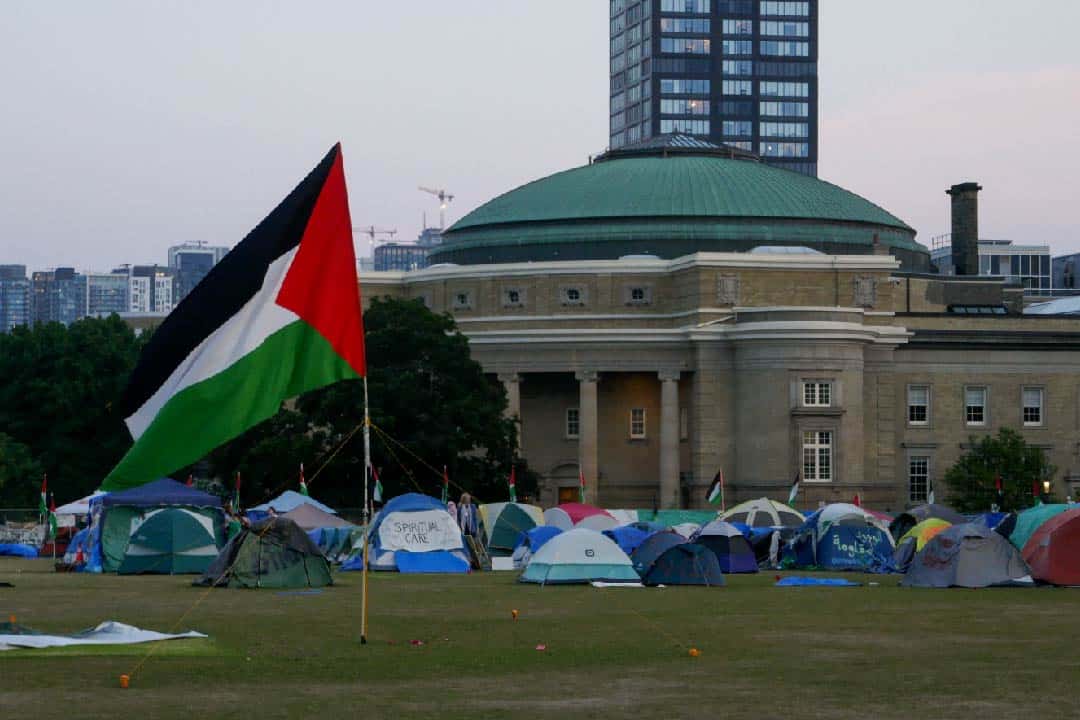My final year of high school in 2020 concluded with a lockdown, a car parade graduation, and a cancelled senior prom. At the time, these events felt world-ending. I could not celebrate with my friends in-person and was instead sitting on patches of grass, exchanging waves from a distance as a form of connection.
Now, in 2024, news publications are trying to draw parallels between the disruption caused by the pandemic to graduation ceremonies and the ongoing university encampments protesting against the genocide in Palestine.
“Millions of high schoolers had their senior years upended by Covid in 2020,” one article in The New York Times wrote. “Four years later, many of those same students have had the traditions of their senior years foiled once again, this time in response to the Israel-Hamas war, and the attempts by universities to shut down or contain widespread protests.”
Yet, I believe these events are absolutely not equivalent, and to compare them is to obscure the true problem of a potential 2024 graduation cancellation.
The lockdowns during the COVID-19 pandemic and the subsequent shuttering of end-of-year events were the result of government regulations and health and safety concerns, as the virus spread globally. My 17-year-old self’s anger at the situation eventually faded into resignation, as I recognized that nothing could bring my senior year back to normal.
The impact of the encampment in King’s College Circle on this year’s graduation is within the control of the administration. Their response to the occupying students’ demands, if addressed with greater urgency rather than offering a “6+ month timeline” for investigating divestment during an ongoing genocide, will determine the outcome.
I think the problem is that the university does not want things resolved if it means damaging financial assets or taking an active political stance.
Upon setting up the encampment on May 2, UofT Occupy for Palestine (O4P) outlined three demands which must be fulfilled before the encampment disbands: disclose all financial investments, divest from any investments sustaining the Israeli government’s genocide in Palestine, and terminate partnerships with Israeli universities.
On May 16, O4P posted an “admin negotiation update” on its Instagram page following a similar post two days prior. Both posts detailed the administration’s proposal of a six-month or longer timeline for “investigating divestment,” which the student group noted is not a binding agreement to divest. Further, the administration’s proposal linked disclosure and divestment as a single action. While divestment is a lengthy process, protestors made clear that “disclosure could happen in mere weeks” if President Meric Gertler “pushes for it himself” or if the business board of University of Toronto’s Asset Management Corporation — the school’s asset investment manager — votes in favour of it at its next meeting.
The administration’s stagnation in divesting aligns with Gertler’s initial response on April 8 to student protesters’ demands, in which he quoted U of T’s Policy on Social and Political Issues with Respect to University Divestment: “The University does not take positions on social or political issues apart from those directly pertinent to higher education and academic research.”
It is clear to me that the administration’s statements dance around the legitimate demands made and questions asked by the protesters under the pretense of not taking a side. In my view, protecting the lives of thousands of Palestinian people is not a political position, but a moral one — which the university has done its best to avoid taking by choking any movement in the mud of bureaucracy.
I feel that if the administration is truly interested in finding a solution for an uninterrupted graduation, it would try to engage with their demands in earnest. It is noteworthy to remind readers that U of T fenced off King’s College Circle on April 27 with signage that stated, “As we prepare for Convocation, these grounds are temporarily closed for protection due to concerns about unauthorized activity.” To me, the university was simply using graduation as an excuse to preemptively suppress the encampment.
Additionally, because recent ceremonies at the University of Southern California and Columbia University were cut short or altered due to “safety concerns,” the possibility of more universities limiting or cancelling their convocation ceremonies hangs over students’ heads. Public sentiments are thus espousing narratives such as “look at these poor fourth-years, with their high school graduations ruined by COVID-19 and their university commencements now also on the chopping block.”
Let me make this very clear: any anger I feel about the possibility of my graduation being impacted has nothing to do with the student encampment and everything to do with the U of T’s shameful response, particularly in their refusal to engage in a proactive and productive conversation with the protesters.
I want to conclude by returning to why this encampment exists in the first place: the Israeli government’s ongoing genocide of the Palestinian people. As of June 4, the Palestinian Ministry of Health estimates that the Israeli government has murdered over 37,000 Palestinian people in Gaza and the Occupied West Bank, more than 15,000 of them being children. My feelings about how the encampments threaten our graduation ceremony pale in comparison to the grief I feel when I remember the thousands of Palestinian children who will never see their first day of elementary school, let alone their university graduation.
Ultimately, I do not think it is useful for the conversation around the encampment to be weighed down by worries about its potential impact on convocation. This graduation means very little; Palestinian lives mean so much more.
Aria Kowal is a fourth-year student studying English. She has requested her college to remain anonymous for safety reasons.


